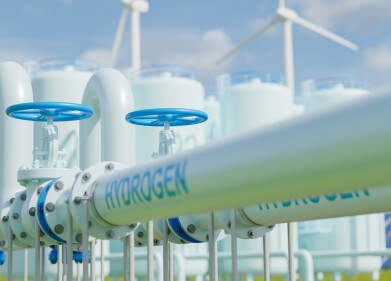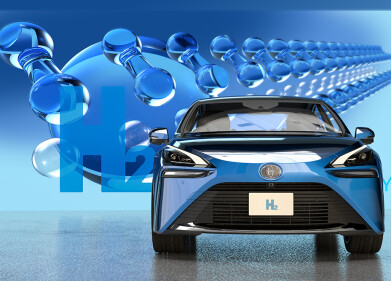Hydrogen fuel
Why are the British government not hot on hydrogen heaters?
Jul 24 2023
Recent UK marketing trends suggest a promising future for hydrogen heaters. Yet, the Competition and Markets Authority (CMA) raises a red flag about the so-called "hydrogen-ready" boilers. The term implies imminent utilization of hydrogen – a carbon dioxide-free gas when combusted – in these boilers. The CMA warns that such assertions may not only be a form of greenwashing, but also potentially a violation of consumer protection laws.
The Government has yet to greenlight the use of hydrogen in the UK's gas grid. As such, consumers purchasing these hydrogen-ready boilers will likely continue burning natural gas. The industry has proposed a possible 20% hydrogen and 80% natural gas mix in the gas grid, but any final decision will only come later this year, with no implementation before 2025.
Such marketing tactics can be misleading, with the CMA suggesting these practices may deceive consumers into believing these boilers possess a unique hydrogen-capable feature, when they are, in reality, no different from boilers sold in the UK since the early 1990s. All boilers since then have been tested with a 23% hydrogen blend. Companies marketing these identical boilers as 'hydrogen-blend' may mislead consumers, warns the CMA.
These concerns arise during a broader CMA review of the heating and insulation sector. The race to heat homes with either heat pumps or hydrogen is a contentious one. Approximately 17% of the UK's carbon emissions emanate from heating homes, making the shift away from natural gas critical to achieving the country's climate goals. Heat pumps, an efficient heating alternative using electricity, and hydrogen hold potential. However, genuine hydrogen boilers are currently absent from the domestic market.
The CMA's scrutiny extends to heat pump and solar panel sellers, with some businesses making unverified claims about their products' energy-saving capabilities. Misrepresentation of actual savings could prevent consumers from making informed decisions, warns the CMA.
Parallel to these developments, the National Grid has sold part of the country’s gas network to a consortium led by Australian investment bank Macquarie amidst ongoing debate over the gas network's future role in achieving net zero carbon emissions. Macquarie aims to use the country’s pipelines to transport hydrogen for cooking and heating via “hydrogen ready” boilers. Critics argue that hydrogen is harder to transport, more energy-intensive to produce and will likely be required for other sectors, such as transportation and heavy industries, before reaching households.
Despite critics, proponents like Chris O’Shea, Centrica's boss, believe prematurely dismissing hydrogen heating could jeopardize the net-zero goal. However, the National Grid opts for increased electrification, selling its controlling interest in gas transmission to focus on electricity distribution.
The Energy Secretary, Grant Shapps, has expressed scepticism about widespread domestic use of hydrogen, citing concerns about costs, safety, and ongoing reliance on fossil fuels. Trials to replace natural gas boilers with hydrogen ones by 2035 have sparked controversy. Local opposition led to the cancellation of a village-wide trial in Whitby, near Ellesmere Port in Cheshire.
The potential of hydrogen for home heating is derived either from extreme temperature fossil fuel gas splitting (blue hydrogen) or by using renewable electricity to split water (green hydrogen). Critics argue that green hydrogen for home heating is six times less energy-efficient than electricity-powered heat pumps, making the switch more cost-effective and emissions-friendly.
Whitby's cancellation highlights the difficulties in decarbonising homes. The UK aims for net-zero emissions by 2050, with domestic heating as a significant challenge. While hydrogen does not emit carbon when burnt, its suitability is fiercely contested, with critics arguing its use should be restricted to industrial applications. The UK government plans to decide on hydrogen's role in home heating by 2026. The Whitby cancellation shows the importance of addressing safety, efficacy, and cost questions when introducing new forms of energy consumption.
The UK's quest for green heating solutions continues amidst these challenges. The journey towards net-zero emissions is laden with complexities, from identifying suitable renewable energy sources to shifting public perceptions. While hydrogen offers potential advantages, it seems clear that its widespread adoption as a domestic heating solution in the UK requires further scrutiny and validation. The "hydrogen-ready" buzz may be premature, but it underscores the crucial ongoing dialogue on renewable energy and green technologies in the UK.
Digital Edition
PIN 25.5 Oct/Nov 2024
November 2024
Analytical Instrumentation - Picturing Viscosity – How Can a Viscometer or a Rheometer Benefit You? - Sustainable Grease Formulations: Evaluating Key Performance Parameters and Testing Method...
View all digital editions
Events
Jan 20 2025 San Diego, CA, USA
Jan 22 2025 Tokyo, Japan
Jan 25 2025 San Diego, CA, USA
SPE Hydraulic Fracturing Technology Conference and Exhibition
Feb 04 2025 The Woodlands, TX, USA
Feb 05 2025 Guangzhou, China



















